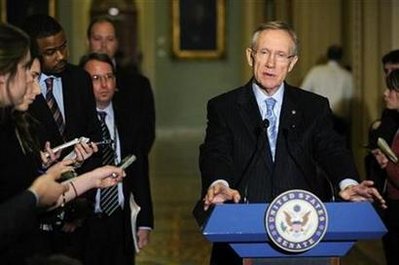Asia-Pacific
Democrats reach deal on US health plan
(Agencies)
Updated: 2009-12-09 11:01
WASHINGTON: Senate Democratic negotiators said they had reached agreement on Tuesday on a compromise on a scaled-back public insurance plan in a broad healthcare overhaul and would seek cost estimates on the deal.
|
 Senate Majority Leader Harry Reid (D-NV) talks to reporters about healthcare legislation after the senate Democrats' weekly policy lunch at the US Capitol in Washington, December 8, 2009. [Agencies] |
"We have a broad agreement," Senate Democratic leader Harry Reid told reporters, refusing to give details on the proposals that will be sent to the Congressional Budget Office.
A team of 10 Senate Democrats -- five liberals and five moderates -- had been working for days on a substitute to the government-run plan included in the Senate bill, which has dismayed some moderates.
Democratic Senate sources said the substitute proposal would create a non-profit plan operated by private insurers but administered by the Office of Personnel Management, which supervises health coverage for federal workers.
The sources said negotiators also sought cost estimates on an expansion of the Medicare health program for the elderly, which is now available at age 65, to Americans as young as 55 who could "buy-in" to the coverage.
"Insurance companies will certainly have more competition," Reid said of the deal. "The American people will certainly have more choices."
The other potential hurdle to the healthcare overhaul was abortion, and the Senate on Tuesday rejected an attempt to tighten restrictions on abortion coverage -- a vote that could threaten a crucial Democrat's support for passage of the final bill.
Democratic Senator Ben Nelson's amendment to tighten the bill's restrictions on the use of federal funds for abortions, identical to a provision approved by the House of Representatives last month, was killed on a 54-45 vote.
Without the abortion language, Nelson had threatened he would not back the final healthcare bill when it came to a vote. If he followed through, Democrats would be one vote short of the 60 they need to pass the measure.
But after his amendment failed, Nelson softened his stance slightly. "It makes it harder to be supportive. We'll see what happens," he told reporters.












